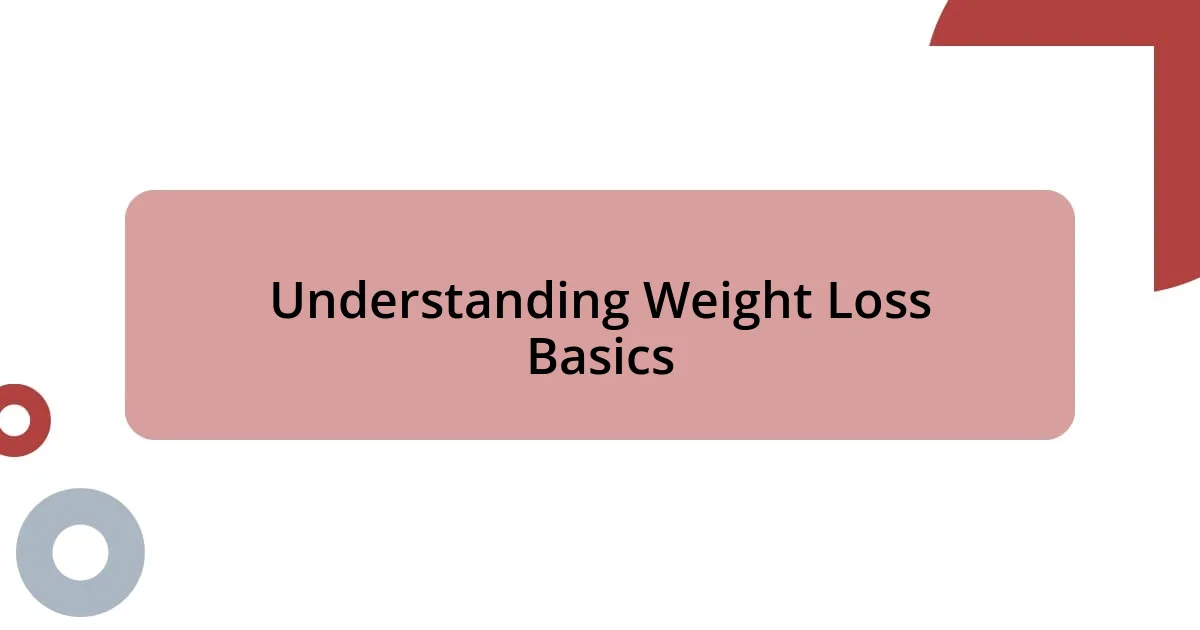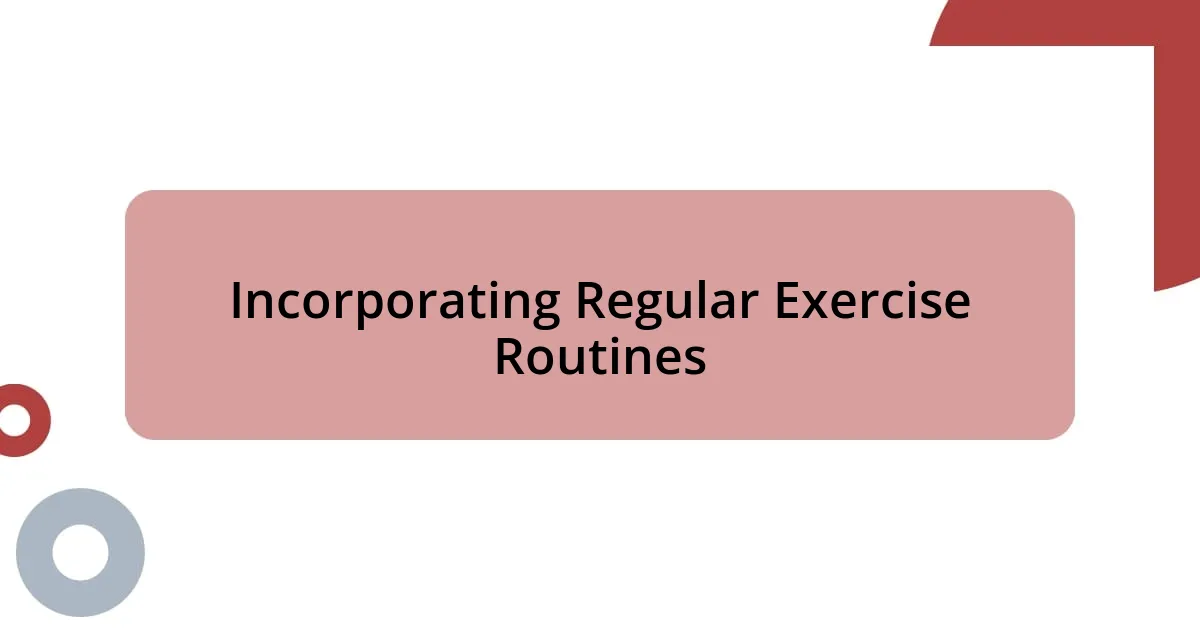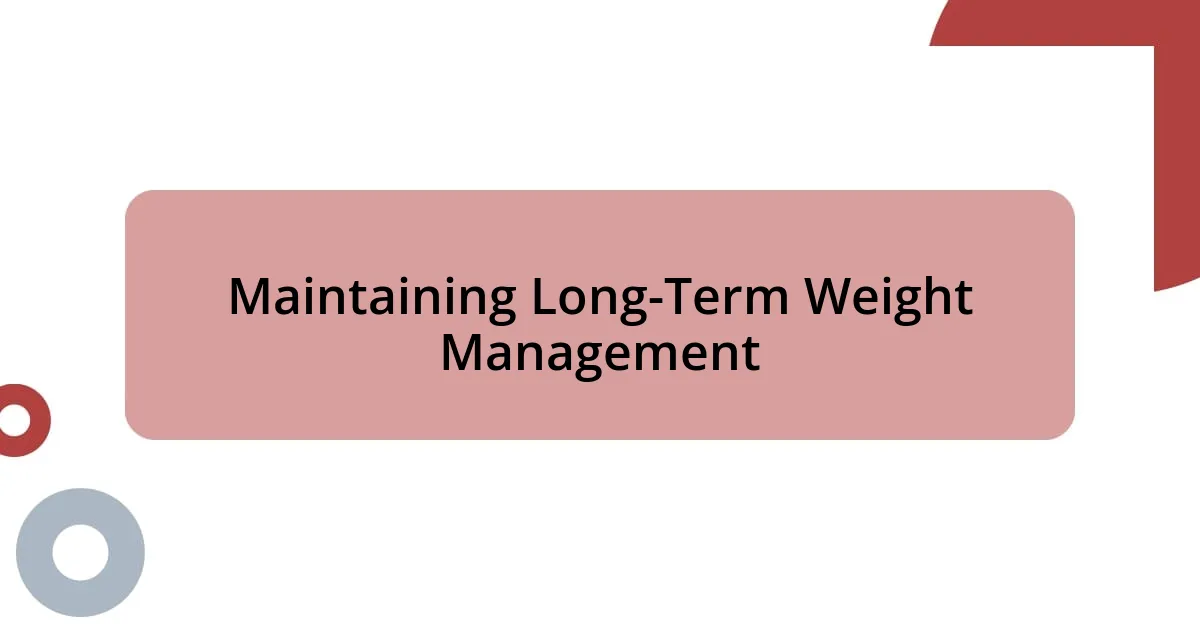Key takeaways:
- Understanding weight loss requires balancing calories, macronutrients, and addressing emotional eating.
- Set realistic, specific goals and celebrate small milestones to maintain motivation and a positive mindset.
- Incorporate variety in meals and exercise routines, focusing on sustainable habits for long-term success.
- Monitor progress holistically by evaluating mood and energy levels, and adjust strategies when facing challenges.

Understanding Weight Loss Basics
Weight loss fundamentally revolves around the concept of calories. It’s simple math: you need to consume fewer calories than you burn. Personally, I remember the moment this clicked for me. I took a close look at my eating habits and realized I was often mindlessly snacking, not even aware of how those extra calories were accumulating. Have you ever felt that way?
Another important factor is understanding macronutrients—proteins, fats, and carbohydrates. Balancing these can make a significant difference in how you feel and your ability to lose weight. When I started paying attention to my protein intake, I noticed I felt fuller longer and had more energy throughout the day. It’s amazing how a few tweaks can transform your approach to eating, don’t you think?
Also, let’s not forget the role of emotional eating. I’ve often found myself reaching for comfort foods during stressful times. Recognizing this pattern has been vital in my journey. Have you noticed similar responses in yourself? By replacing those unhealthy habits with healthier coping strategies, I began to reshape not just my body but also my mindset toward food.

Setting Realistic Weight Goals
Setting realistic weight goals is crucial for long-term success. I often found myself setting lofty targets that felt overwhelming. It wasn’t until I broke down my goals into smaller, achievable milestones that I truly began to appreciate the progress I was making. For instance, instead of aiming to lose 30 pounds at once, I focused on just 5 pounds at a time. Each small victory not only boosted my confidence but also reinforced healthier habits. Have you ever experienced that sense of accomplishment from reaching a mini-goal?
To help guide your goal-setting process, consider these key points:
- Be Specific: Instead of saying “I want to lose weight,” specify “I want to lose 10 pounds in three months.”
- Set Timeframes: Establish a realistic timeline that gives you enough flexibility while keeping you accountable.
- Celebrate Milestones: Reward yourself for achieving small goals, like treating yourself to a movie or a new workout outfit.
- Focus on Habits: Shift some goals towards healthy habits, like exercising three times a week or cooking at home more often.
- Stay Flexible: Life happens, so be prepared to adjust your goals as needed; it’s all part of the journey.
Recognizing the importance of adjusting my targets based on life’s unpredictability has saved me from countless moments of frustration. It’s a reminder that weight loss is often a marathon, not a sprint.

Creating a Balanced Diet Plan
Creating a balanced diet plan is essential for sustainable weight loss. In my experience, the first step was understanding my body’s needs. I learned to listen to my hunger cues rather than eating out of habit or boredom. Every time I shifted my focus to nutrient-dense foods—like leafy greens and lean proteins—I felt more energized and less prone to cravings. Have you noticed how real nourishment can change your perspective on meals?
While crafting my meal plans, I discovered the value of variety. Initially, I gravitated toward the same foods repeatedly, thinking it would make things easier. However, incorporating different fruits, vegetables, and whole grains not only kept me excited about my meals but also ensured I received a broad range of nutrients. I remember my first attempt at meal prepping; I was shocked at how much I enjoyed trying new flavors without feeling overwhelmed during the week. What about you? Have you gone outside your culinary comfort zone, and how did it feel?
It’s also important to consider portion control. I learned early on that even healthy foods can contribute to weight gain if consumed in large quantities. Using smaller plates made a noticeable difference—it’s surprising how just altering the presentation can affect our brains. Moreover, I started to visualize meals as colorful plates of balanced nutrients rather than just a mound of food, which made the dining experience not only healthier but visually appealing too. Does this tactic resonate with you?
| Food Group | Examples |
|---|---|
| Proteins | Chicken, fish, legumes |
| Carbohydrates | Quinoa, brown rice, sweet potatoes |
| Fats | Avocado, nuts, olive oil |
| Vegetables | Spinach, broccoli, bell peppers |
| Fruits | Blueberries, apples, bananas |

Incorporating Regular Exercise Routines
Incorporating regular exercise routines has been a game-changer in my weight reduction journey. Initially, I struggled with finding the motivation to get moving, often telling myself I was too busy or too tired. Then, I decided to schedule short workouts, even just 15-20 minutes a day, and suddenly it became something I looked forward to. There’s something refreshing about that moment when you realize you’ve shifted from seeing exercise as a chore to viewing it as a self-care ritual. Have you ever experienced that transformation in your fitness mindset?
Once I found my groove, I quickly understood the power of variety in exercise. I made it a point to try different activities—like dance classes, hiking, or yoga—so I wouldn’t get bored. I still remember the first time I tried Zumba. I was apprehensive at first, but once the music started, I lost myself in the rhythm. It was invigorating, and I was sweating while smiling—a win-win! When was the last time you tried something new that ignited a spark for you?
Additionally, I learned the value of being consistent rather than aiming for perfection. There were days when life got hectic, and I couldn’t even squeeze in a short workout. Instead of dwelling on it, I focused on getting back on track the next day. Treating exercise like a lifelong habit rather than a fleeting phase made all the difference. It’s been a journey of embracing the ups and downs. Doesn’t it feel liberating to know that every effort, no matter how small, counts toward a healthier you?

Monitoring Progress and Adjustments
Tracking my progress has been a pivotal part of my weight loss journey. I remember starting with weekly weigh-ins, jotting down my weight in a journal, but soon realized that the numbers on the scale weren’t the only indicators of my success. Measuring my mood, energy levels, and how my clothes fit gave me a more holistic view of my progress. Have you ever noticed how your mental state can shift alongside physical changes?
Adjustments became necessary as I monitored my results. There were weeks where I hit a plateau, and it was discouraging. Instead of giving up, I took a step back and reassessed my meal and exercise plans. For instance, when I welcomed more strength training into my routine, I noticed the scale didn’t budge, but my muscle tone changed, and I felt stronger. It’s fascinating how sometimes what isn’t seen on the surface can be just as important as the numbers. Have you experienced something similar in your journey?
Incorporating feedback loops was another key strategy for me. After a few months, I decided to check in with myself more frequently—almost like having a conversation with my goals. I would ask questions, like, “What’s working?” or “What feels heavy?” This reflection often sparked changes that kept me motivated. I vividly recall a moment when I chose a healthy snack over my usual sweet treat, realizing each small decision is a step in the right direction. How do you keep yourself encouraged when the journey gets tough?

Overcoming Weight Loss Challenges
Facing weight loss challenges is often part of my journey, and it can feel overwhelming at times. I remember feeling frustrated when my progress seemed stagnant; it was as if I was pushing a boulder uphill with no end in sight. What helped me push through those tough moments was embracing a mindset shift—I realized that every small step forward counts. Have you ever found yourself trapped in a similar cycle of frustration?
On tougher days, I learned the importance of building a support system. Some of my friends joined me on this journey, and sharing our struggles turned it into a collective experience. I think of it like being on a rollercoaster together; the highs were exhilarating, and the dips felt less daunting knowing I wasn’t alone. Has a support group ever given you the strength to continue when motivation waned?
An unexpected hurdle I encountered was food cravings. I found myself battling the emotional ties to certain foods. Instead of giving in to guilt, I started practicing mindfulness while eating. I remember savoring a piece of dark chocolate, truly tasting it instead of mindlessly consuming it. This practice transformed my relationship with cravings, turning them into moments of enjoyment rather than guilt. How have you navigated the emotional aspects of food in your own weight loss journey?

Maintaining Long-Term Weight Management
Maintaining long-term weight management is all about establishing sustainable habits. I vividly recall when I made a commitment to incorporate more whole foods into my meals. Initially, I was apprehensive about giving up my go-to snacks, but I discovered that replacing them with fruits and nuts not only satisfied my cravings but also fueled my energy. Have you ever found that the simplest changes can feel the most rewarding?
One of the significant shifts for me was redefining my relationship with exercise. Instead of viewing it as a chore, I started embracing activities that genuinely brought me joy—like dancing or hiking. I often think about how much more likely I am to stick with a routine that makes me smile. What activities do you enjoy that might make physical activity feel less like a task and more like a treat?
As I navigated the ups and downs of weight management, I realized the importance of self-compassion. There were times I would slip into old habits, and rather than berating myself, I chose to celebrate my journey instead. I remember a weekend where I indulged in pizza—a choice I initially viewed as a setback. But then, I acknowledged that one meal wouldn’t undo my progress. Have you ever transformed a moment of indulgence into an opportunity for growth?














